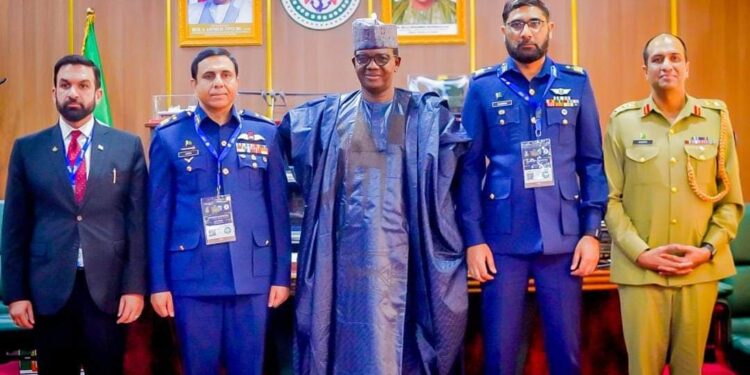The Middle-Belt Forum of good Governance, says that the Hon. Minister of State for Defence, Dr. Bello Matawalle, requires prayers and support to restore the nation’s security, rather than distractions and condemnation from partisan politics.
The National Coordinator of the Forum, Idoko Uche, said this during an interactive session with journalists.
He highlighted that several notorious bandits in Zamfara, Sokoto, Kebbi, Katsina, and Kaduna States have been neutralized recently in what was described as one of the most effective, concerted, and coordinated military operations in Nigeria.
According to him, the ongoing military offensive in the North West region has yielded positive results in the past three weeks.
“This was achieved following the directive of President Bola Tinubu, for Dr. Matawalle, Chief of Defence Staff, Gen. Christopher Musa and other top military officers relocate to Sokoto for a second time, to eradicate bandits in the region.
A renowned strategist with immense political savvy and determination, Dr. Matawalle quickly visited Sabon Birnin, Goronyo, and Rabah, as well as Isa Local Government Area, which shares a boundary with Shinkafi Local Government Area in Zamfara State, and borders Sabon Birnin, Goronyo in Sokoto State, and Niger Republic.
“These areas are notorious for arms smuggling through porous borders. Bandit kingpin Bello Turji and his cohorts are in disarray, with no option but to surrender or face elimination, like their mentor Habibu Sububu,” Uche said.
He further stated that the success so far reflects the total commitment of Dr. Matawalle and Gen. Musa in flushing out the criminal elements that have terrorized the region for over 15 years.
These criminals he said, have engaged in kidnapping for ransom, killings, armed robbery, rape, illegal taxation, extortion, and displacing people from their communities, exerting control over rural areas.
“We call on unscrupulous politicians, misguided clerics, local residents, traditional rulers, and unpatriotic security agents to stop sabotaging the fight against banditry in the North West region, which is being effectively coordinated by Dr. Matawalle and the military chiefs.
“The synergy between the security agencies and the Minister of State for Defence is a clear testament to the effectiveness of President Tinubu’s Renewed Hope Agenda, aimed at restoring national security, prosperity, and greatness.
“Anyone who disparages those leading the fight against banditry, insurgency, militancy, and terrorism is either aiding these criminals or is unhappy with the president’s resolve to end insecurity in Nigeria,” Uche said.
According to him, any serving, or former governor, or retired military officer who distracts the ongoing military operation in the North West is a saboteur looking to siphon security funds for personal gain.
He revealed that it is clear that some governors exploit insecurity to loot funds and want the crisis to persist. They should stop this unpatriotic act, as they will eventually be held accountable for their actions.
“What the Minister of State for Defence, Chief of Defence Staff, National Security Adviser Nuhu Ribadu, and other security chiefs need are prayers, encouragement, and logistical support to eradicate banditry in the North West, not personal attacks or condemnation that hinder this crucial national mission.
“It is unfortunate that the Peoples Democratic Party (PDP) in Zamfara State has resorted to politicizing national security, displaying ignorance of military command structures and operations, which shows the party is out of ideas and confused in its attempt to discredit Matawalle.
“Claiming that the Minister of State for Defence abandoned his home state of Zamfara to coordinate the fight against banditry in Sokoto is an insult to Nigerians who desire public safety, peace, and unity, and reduces serious national issues to mundane partisan politics.
“President Tinubu directed the Minister of State for Defence, the Chief of Defence Staff, and other top military officers to relocate to Sokoto at the 8th Division of the Nigerian Army, which covers Sokoto, Kebbi, Zamfara, and Katsina States.
“In line with military command structures, the 8th Division oversees military activities in these areas. However, out of ignorance, the PDP in Zamfara criticized Matawalle for staying in Sokoto instead of Zamfara to coordinate the anti-banditry operations with military chiefs.
“Dr. Bello Matawalle is a Minister of the Federal Republic of Nigeria, not a minister of Zamfara State”, according to the forum’s Coordinator.
Uche disclosed that President Bola Tinubu directed the minister to relocate to Sokoto, along with the Chief of Defence Staff, to coordinate the fight against banditry in the North West, which also covers Zamfara.
He noted that, “In this operation, the notorious bandit kingpin Jamilu Sububu, among others, was neutralized.
“Sadly, the same PDP that frustrated Matawalle’s efforts in providing public safety and order in Zamfara and the nation is now hypocritically making noise that Matawalle operates from Sokoto instead of Zamfara in the fight to eliminate bandits in the North West.
“This is the danger of do-or-die politics, which replaces progressive governance in a misguided attempt to have the president drop him as a minister, thereby elongating PDP misrule in Zamfara.”











